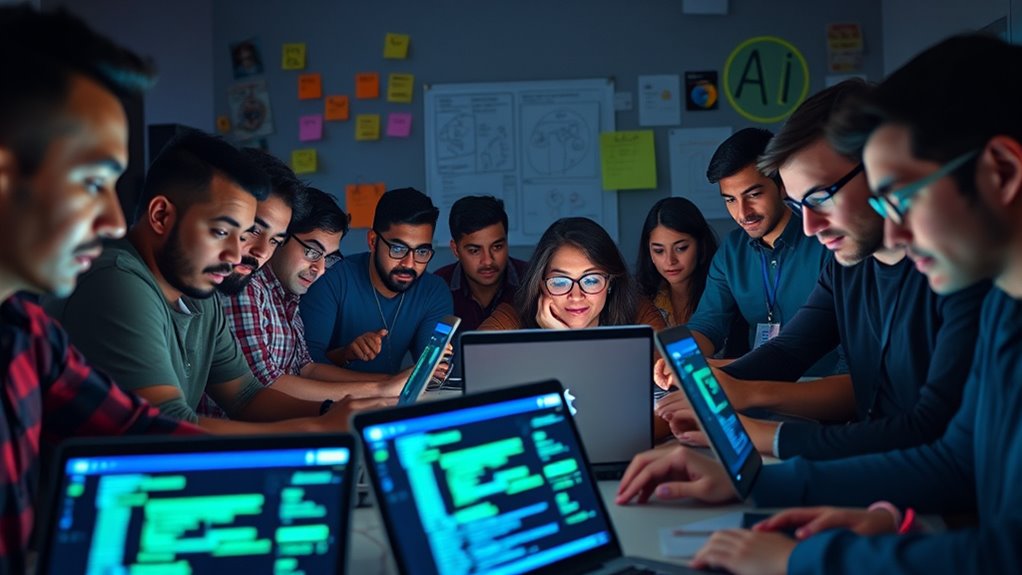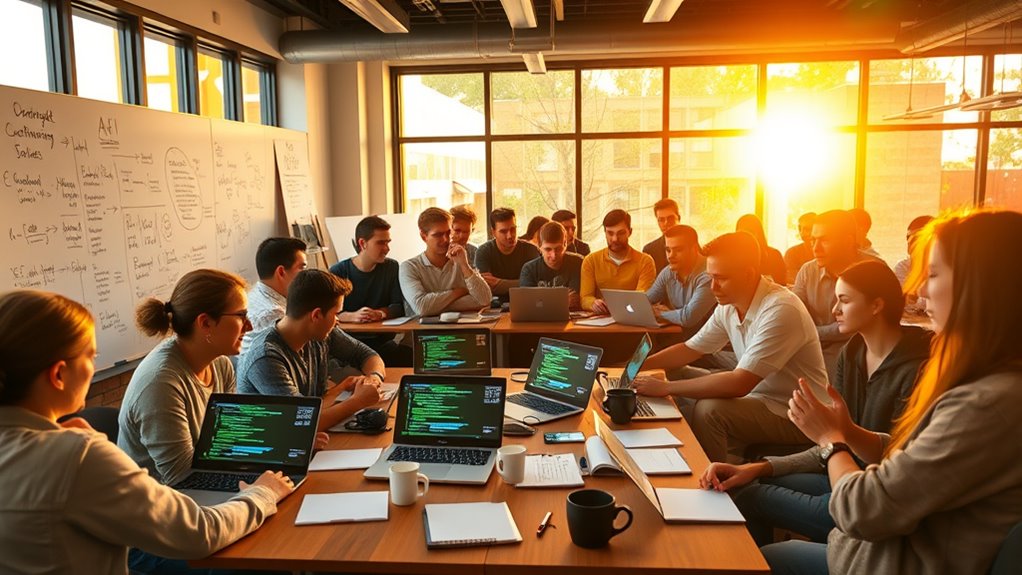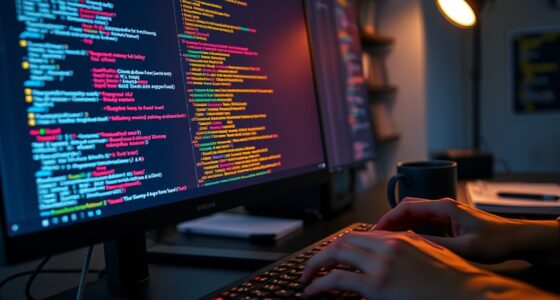The open source community is quickly adopting AI-powered coding tools to boost productivity and foster innovation. These tools help you write, review, and improve code collaboratively, making development more inclusive and efficient. They streamline communication and can accelerate project timelines, but you need to be mindful of licensing and legal challenges. Staying aware of best practices guarantees responsible use. If you keep exploring, you’ll discover how these tools are shaping the future of open source collaboration.
Key Takeaways
- Open source projects rapidly adopted AI coding tools to enhance productivity and streamline collaborative development processes.
- AI-assisted suggestions and bug detection reduced review times and improved code quality across multiple open source initiatives.
- Communities established guidelines and review protocols to ensure licensing compliance and maintain project consistency with AI-generated code.
- Transparent integration strategies fostered inclusivity, enabling more contributors to participate effectively in AI-augmented projects.
- Ongoing focus on licensing awareness and responsible AI use helped balance innovation with legal and collaborative best practices.

The open source community is quickly adopting AI-powered coding tools to boost productivity and innovation. These tools are transforming how developers collaborate, making it easier to write, review, and improve code collectively. With AI assisting in code suggestions, bug detection, and documentation, you can now contribute more efficiently and focus on higher-level problem-solving. As a result, open source projects are gaining momentum, attracting new contributors keen to leverage this technology. However, this shift isn’t without its hurdles. One of the most significant challenges you face is maintaining effective collaborative development. When multiple contributors work on the same project, AI tools can help streamline communication and code integration, but they also demand a shared understanding of how AI-generated suggestions fit into the project’s coding standards. Ensuring that everyone remains aligned and that the AI’s input doesn’t introduce inconsistencies requires clear guidelines and active moderation. Additionally, you must navigate licensing challenges that come with integrating AI tools into open source workflows. Many AI models are trained on vast datasets that may include proprietary or licensed code, raising questions about the legal use of AI-generated suggestions. When your project incorporates AI-assisted code, you need to be cautious about licensing compliance, especially if the AI tool outputs code snippets that could be considered derivative works. This can create legal gray areas, making it essential to understand the licensing agreements of your tools and datasets thoroughly. Open source licenses vary widely in terms of permissions and restrictions, and using AI-generated code might inadvertently violate these terms if you’re not careful. This means you need to stay informed about the licensing landscape and implement policies for code review and attribution. In practice, this often involves establishing clear protocols for contributions, ensuring that AI-assisted code is reviewed for licensing compatibility before merging. You might also need to choose AI tools that are specifically designed with open source licensing in mind or that offer transparency about their training data and outputs. Despite these challenges, the benefits of AI in collaborative development are undeniable. With AI, you’re empowered to write cleaner, more efficient code and to identify issues more swiftly. As these tools continue to evolve, you’ll find that they not only accelerate project timelines but also foster a more inclusive and dynamic open source environment, where contributions are easier and more accessible than ever before. Recognizing the importance of vetted products and understanding licensing implications are crucial steps toward responsible AI adoption. The key is balancing innovation with careful management of legal and collaborative considerations, ensuring that AI becomes a powerful asset rather than a source of friction. Moreover, staying informed about best practices in software licensing can help mitigate potential legal risks associated with AI-generated contributions. Additionally, adopting standardized guidelines for AI integration can further promote transparency and consistency across open source projects.
Frequently Asked Questions
How Has AI Impacted Open Source Project Quality?
AI has considerably improved open source project quality by enhancing code review processes, making them faster and more accurate. It helps identify bugs and vulnerabilities early, reducing errors. Additionally, AI streamlines contributor onboarding by providing personalized guidance and automated documentation, encouraging more participation. As a result, projects become more robust and inclusive, ultimately elevating the overall quality and sustainability of open source communities.
What Are the Main Challenges in Adopting AI Tools?
Like steering a winding river, adopting AI tools presents challenges. You must steer clear of hidden rocks such as AI ethics, ensuring responsible use, and invest in user training, like building sturdy boats to handle the currents. Balancing innovation with ethical considerations requires careful planning, patience, and skill. Without proper guidance, you risk drifting off course, but with focus, you can harness AI’s power while safeguarding your project’s integrity.
How Do Community Members Perceive Ai-Generated Code?
You might find that community members view AI-generated code with mixed feelings. Some appreciate how it speeds up development and aids in code review, making collaboration more efficient. Others worry about maintaining quality and trust in the code. Overall, community engagement remains strong, but members often emphasize the importance of reviewing AI-produced code carefully, ensuring it aligns with project standards and fosters trust within the open source community.
Are There Licensing Concerns With Ai-Assisted Contributions?
Licensing concerns can definitely complicate AI-assisted contributions. You might worry about intellectual property issues, especially if AI-generated code pulls from copyrighted sources. To stay compliant, you need clear licensing policies and diligent documentation. Ensuring licensing compliance helps prevent legal liabilities and preserves open source integrity. So, before sharing AI-enhanced code, check licenses thoroughly, and foster transparency to keep community trust and creativity thriving without legal limbo.
What Future Developments Are Expected in AI Coding Tools?
You should expect AI coding tools to evolve with features like automated code review and predictive bug fixing, which will make your development process faster and more efficient. Future developments may include better integration with existing IDEs, enhanced accuracy in identifying issues, and personalized suggestions tailored to your coding style. These advancements will help you catch errors early, improve code quality, and streamline collaboration across projects.
Conclusion
As you plunge into the open source world, imagine AI coding tools as guiding stars lighting your path through the vast night sky of innovation. They empower you to craft, collaborate, and elevate your projects faster than ever before. Embracing these tools isn’t just a step forward—it’s a leap into a universe where collective creativity shines brighter, transforming the way you build and share code. The future of open source is yours to shape, illuminated by AI’s endless possibilities.









